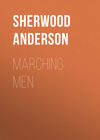Kitabı oku: «Triumph of the Egg, and Other Stories», sayfa 5
The farmer hitched his horse and brought it to the door and the doctor drove off feeling strangely weak and at the same time strong. How simple now seemed the thing he had yet to do. Perhaps when he got home his daughter would have gone to bed but he would ask her to get up and come into the office. Then he would tell the whole story of his marriage and its failure sparing himself no humiliation. "There was something very dear and beautiful in my Ellen and I must make Mary understand that. It will help her to be a beautiful woman," he thought, full of confidence in the strength of his resolution.
He got to the door of the livery barn at eleven o'clock and Barney Smithfield with young Duke Yetter and two other men sat talking there. The liveryman took his horse away into the darkness of the barn and the doctor stood for a moment leaning against the wall of the building. The town's night watchman stood with the group by the barn door and a quarrel broke out between him and Duke Yetter, but the doctor did not hear the hot words that flew back and forth or Duke's loud laughter at the night watchman's anger. A queer hesitating mood had taken possession of him.
There was something he passionately desired to do but could not remember. Did it have to do with his wife Ellen or Mary his daughter? The figures of the two women were again confused in his mind and to add to the confusion there was a third figure, that of the woman he had just assisted through child birth. Everything was confusion. He started across the street toward the entrance of the stairway leading to his office and then stopped in the road and stared about. Barney Smithfield having returned from putting his horse in the stall shut the door of the barn and a hanging lantern over the door swung back and forth. It threw grotesque dancing shadows down over the faces and forms of the men standing and quarreling beside the wall of the barn.
* * * * *
Mary sat by a window in the doctor's office awaiting his return. So absorbed was she in her own thoughts that she was unconscious of the voice of Duke Yetter talking with the men in the street.
When Duke had come into the street the hot anger of the early part of the evening had returned and she again saw him advancing toward her in the orchard with the look of arrogant male confidence in his eyes but presently she forgot him and thought only of her father. An incident of her childhood returned to haunt her. One afternoon in the month of May when she was fifteen her father had asked her to accompany him on an evening drive into the country. The doctor went to visit a sick woman at a farmhouse five miles from town and as there had been a great deal of rain the roads were heavy. It was dark when they reached the farmer's house and they went into the kitchen and ate cold food off a kitchen table. For some reason her father had, on that evening, appeared boyish and almost gay. On the road he had talked a little. Even at that early age Mary had grown tall and her figure was becoming womanly. After the cold supper in the farm kitchen he walked with her around the house and she sat on a narrow porch. For a moment her father stood before her. He put his hands into his trouser pockets and throwing back his head laughed almost heartily. "It seems strange to think you will soon be a woman," he said. "When you do become a woman what do you suppose is going to happen, eh? What kind of a life will you lead? What will happen to you?"
The doctor sat on the porch beside the child and for a moment she had thought he was about to put his arm around her. Then he jumped up and went into the house leaving her to sit alone in the darkness.
As she remembered the incident Mary remembered also that on that evening of her childhood she had met her father's advances in silence. It seemed to her that she, not her father, was to blame for the life they had led together. The farm laborer she had met on the bridge had not felt her father's coldness. That was because he had himself been warm and generous in his attitude toward the man who had cared for him in his hour of sickness and misfortune. Her father had said that the laborer knew how to be a father and Mary remembered with what warmth the two boys fishing by the creek had called to her as she went away into the darkness. "Their father has known how to be a father because his children have known how to give themselves," she thought guiltily. She also would give herself. Before the night had passed she would do that. On that evening long ago and as she rode home beside her father he had made another unsuccessful effort to break through the wall that separated them. The heavy rains had swollen the streams they had to cross and when they had almost reached town he had stopped the horse on a wooden bridge. The horse danced nervously about and her father held the reins firmly and occasionally spoke to him. Beneath the bridge the swollen stream made a great roaring sound and beside the road in a long flat field there was a lake of flood water. At that moment the moon had come out from behind clouds and the wind that blew across the water made little waves. The lake of flood water was covered with dancing lights. "I'm going to tell you about your mother and myself," her father said huskily, but at that moment the timbers of the bridge began to crack dangerously and the horse plunged forward. When her father had regained control of the frightened beast they were in the streets of the town and his diffident silent nature had reasserted itself.
Mary sat in the darkness by the office window and saw her father drive into the street. When his horse had been put away he did not, as was his custom, come at once up the stairway to the office but lingered in the darkness before the barn door. Once he started to cross the street and then returned into the darkness.
Among the men who for two hours had been sitting and talking quietly a quarrel broke out. Jack Fisher the town nightwatchman had been telling the others the story of a battle in which he had fought during the Civil War and Duke Yetter had begun bantering him. The nightwatchman grew angry. Grasping his nightstick he limped up and down. The loud voice of Duke Yetter cut across the shrill angry voice of the victim of his wit. "You ought to a flanked the fellow, I tell you Jack. Yes sir 'ee, you ought to a flanked that reb and then when you got him flanked you ought to a knocked the stuffings out of the cuss. That's what I would a done," Duke shouted, laughing boisterously. "You would a raised hell, you would," the night watchman answered, filled with ineffectual wrath.
The old soldier went off along the street followed by the laughter of Duke and his companions and Barney Smithfield, having put the doctor's horse away, came out and closed the barn door. A lantern hanging above the door swung back and forth. Doctor Cochran again started across the street and when he had reached the foot of the stairway turned and shouted to the men. "Good night," he called cheerfully. A strand of hair was blown by the light summer breeze across Mary's cheek and she jumped to her feet as though she had been touched by a hand reached out to her from the darkness. A hundred times she had seen her father return from drives in the evening but never before had he said anything at all to the loiterers by the barn door. She became half convinced that not her father but some other man was now coming up the stairway.
The heavy dragging footsteps rang loudly on the wooden stairs and Mary heard her father set down the little square medicine case he always carried. The strange cheerful hearty mood of the man continued but his mind was in a confused riot. Mary imagined she could see his dark form in the doorway. "The woman has had a baby," said the hearty voice from the landing outside the door. "Who did that happen to? Was it Ellen or that other woman or my little Mary?"
A stream of words, a protest came from the man's lips. "Who's been having a baby? I want to know. Who's been having a baby? Life doesn't work out. Why are babies always being born?" he asked.
A laugh broke from the doctor's lips and his daughter leaned forward and gripped the arms of her chair. "A babe has been born," he said again. "It's strange eh, that my hands should have helped a baby be born while all the time death stood at my elbow?"
Doctor Cochran stamped upon the floor of the landing. "My feet are cold and numb from waiting for life to come out of life," he said heavily. "The woman struggled and now I must struggle."
Silence followed the stamping of feet and the tired heavy declaration from the sick man's lips. From the street below came another loud shout of laughter from Duke Yetter.
And then Doctor Cochran fell backward down the narrow stairs to the street. There was no cry from him, just the clatter of his shoes upon the stairs and the terrible subdued sound of the body falling.
Mary did not move from her chair. With closed eyes she waited. Her heart pounded. A weakness complete and overmastering had possession of her and from feet to head ran little waves of feeling as though tiny creatures with soft hair-like feet were playing upon her body.
It was Duke Yetter who carried the dead man up the stairs and laid him on a bed in one of the rooms back of the office. One of the men who had been sitting with him before the door of the barn followed lifting his hands and dropping them nervously. Between his fingers he held a forgotten cigarette the light from which danced up and down in the darkness.
SENILITY
He was an old man and he sat on the steps of the railroad station in a small Kentucky town.
A well dressed man, some traveler from the city, approached and stood before him.
The old man became self-conscious.
His smile was like the smile of a very young child. His face was all sunken and wrinkled and he had a huge nose.
"Have you any coughs, colds, consumption or bleeding sickness?" he asked. In his voice there was a pleading quality.
The stranger shook his head. The old man arose.
"The sickness that bleeds is a terrible nuisance," he said. His tongue protruded from between his teeth and he rattled it about. He put his hand on the stranger's arm and laughed.
"Bully, pretty," he exclaimed. "I cure them all—coughs, colds, consumption and the sickness that bleeds. I take warts from the hand—I cannot explain how I do it—it is a mystery—I charge nothing—my name is Tom—do you like me?"
The stranger was cordial. He nodded his head. The old man became reminiscent. "My father was a hard man," he declared. "He was like me, a blacksmith by trade, but he wore a plug hat. When the corn was high he said to the poor, 'go into the fields and pick' but when the war came he made a rich man pay five dollars for a bushel of corn."
"I married against his will. He came to me and he said, 'Tom I do not like that girl.'"
"'But I love her,' I said.
"'I don't,' he said.
"My father and I sat on a log. He was a pretty man and wore a plug hat. 'I will get the license,' I said.
"'I will give you no money,' he said.
"My marriage cost me twenty-one dollars—I worked in the corn—it rained and the horses were blind—the clerk said, 'Are you over twenty- one?' I said 'yes' and she said 'yes.' We had chalked it on our shoes. My father said, 'I give you your freedom.' We had no money. My marriage cost twenty-one dollars. She is dead."
The old man looked at the sky. It was evening and the sun had set. The sky was all mottled with grey clouds. "I paint beautiful pictures and give them away," he declared. "My brother is in the penitentiary. He killed a man who called him an ugly name."
The decrepit old man held his hands before the face of the stranger. He opened and shut them. They were black with grime. "I pick out warts," he explained plaintively. "They are as soft as your hands."
"I play on an accordion. You are thirty-seven years old. I sat beside my brother in the penitentiary. He is a pretty man with pompadour hair. 'Albert' I said, 'are you sorry you killed a man?' 'No,' he said, 'I am not sorry. I would kill ten, a hundred, a thousand!'"
The old man began to weep and to wipe his hands with a soiled handkerchief. He attempted to take a chew of tobacco and his false teeth became displaced. He covered his mouth with his hands and was ashamed.
"I am old. You are thirty-seven years old but I am older than that," he whispered.
"My brother is a bad man—he is full of hate—he is pretty and has pompadour hair, but he would kill and kill. I hate old age—I am ashamed that I am old.
"I have a pretty new wife. I wrote her four letters and she replied. She came here and we married—I love to see her walk—O, I buy her pretty clothes.
"Her foot is not straight—it is twisted—my first wife is dead—I pick warts off the hand with my fingers and no blood comes—I cure coughs, colds, consumption and the sickness that bleeds—people can write to me and I answer the letters—if they send me no money it is no matter—all is free."
Again the old man wept and the stranger tried to comfort him. "You are a happy man?" the stranger asked.
"Yes," said the old man, "and a good man too. Ask everywhere about me— my name is Tom, a blacksmith—my wife walks prettily although she has a twisted foot—I have bought her a long dress—she is thirty and I am seventy-five—she has many pairs of shoes—I have bought them for her, but her foot is twisted—I buy straight shoes—
"She thinks I do not know—everybody thinks Tom does not know—I have bought her a long dress that comes down to the ground—my name is Tom, a blacksmith—I am seventy-five and I hate old age—I take warts off the hands and no blood comes—people may write to me and I answer the letters—all is free."
THE MAN IN THE BROWN COAT
Napoleon went down into a battle riding on a horse.
Alexander went down into a battle riding on a horse.
General Grant got off a horse and walked in a wood.
General Hindenburg stood on a hill.
The moon came up out of a clump of bushes.
* * * * *
I am writing a history of the things men do. I have written three such histories and I am but a young man. Already I have written three hundred, four hundred thousand words.
My wife is somewhere in this house where for hours now I have been sitting and writing. She is a tall woman with black hair, turning a little grey. Listen, she is going softly up a flight of stairs. All day she goes softly about, doing the housework in our house.
I came here to this town from another town in the state of Iowa. My father was a workman, a house painter. He did not rise in the world as I have done. I worked my way through college and became an historian. We own this house in which I sit. This is my room in which I work. Already I have written three histories of peoples. I have told how states were formed and battles fought. You may see my books standing straight up on the shelves of libraries. They stand up like sentries.
I am tall like my wife and my shoulders are a little stooped. Although I write boldly I am a shy man. I like being at work alone in this room with the door closed. There are many books here. Nations march back and forth in the books. It is quiet here but in the books a great thundering goes on.
* * * * *
Napoleon rides down a hill and into a battle.
General Grant walks in a wood.
Alexander rides down a hill and into a battle.
* * * * *
My wife has a serious, almost stern look. Sometimes the thoughts I have concerning her frighten me. In the afternoon she leaves our house and goes for a walk. Sometimes she goes to stores, sometimes to visit a neighbor. There is a yellow house opposite our house. My wife goes out at a side door and passes along the street between our house and the yellow house.
The side door of our house bangs. There is a moment of waiting. My wife's face floats across the yellow background of a picture.
* * * * *
General Pershing rode down a hill and into a battle.
Alexander rode down a hill and into a battle.
* * * * *
Little things are growing big in my mind. The window before my desk makes a little framed place like a picture. Every day I sit staring. I wait with an odd sensation of something impending. My hand trembles. The face that floats through the picture does something I don't understand. The face floats, then it stops. It goes from the right hand side to the left hand side, then it stops.
The face comes into my mind and goes out—the face floats in my mind. The pen has fallen from my fingers. The house is silent. The eyes of the floating face are turned away from me.
My wife is a girl who came here to this town from another town in the state of Ohio. We keep a servant but my wife often sweeps the floors and she sometimes makes the bed in which we sleep together. We sit together in the evening but I do not know her. I cannot shake myself out of myself. I wear a brown coat and I cannot come out of my coat. I cannot come out of myself. My wife is very gentle and she speaks softly but she cannot come out of herself.
My wife has gone out of the house. She does not know that I know every little thought of her life. I know what she thought when she was a child and walked in the streets of an Ohio town. I have heard the voices of her mind. I have heard the little voices. I heard the voice of fear crying when she was first overtaken with passion and crawled into my arms. Again I heard the voices of fear when her lips said words of courage to me as we sat together on the first evening after we were married and moved into this house.
It would be strange if I could sit here, as I am doing now, while my own face floated across the picture made by the yellow house and the window. It would be strange and beautiful if I could meet my wife, come into her presence.
The woman whose face floated across my picture just now knows nothing of me. I know nothing of her. She has gone off, along a street. The voices of her mind are talking. I am here in this room, as alone as ever any man God made.
It would be strange and beautiful if I could float my face across my picture. If my floating face could come into her presence, if it could come into the presence of any man or any woman—that would be a strange and beautiful thing to have happen.
* * * * *
Napoleon went down into a battle riding on a horse.
General Grant went into a wood.
Alexander went down into a battle riding on a horse.
* * * * *
I'll tell you what—sometimes the whole life of this world floats in a human face in my mind. The unconscious face of the world stops and stands still before me.
Why do I not say a word out of myself to the others? Why, in all our life together, have I never been able to break through the wall to my wife?
Already I have written three hundred, four hundred thousand words. Are there no words that lead into life? Some day I shall speak to myself. Some day I shall make a testament unto myself.
BROTHERS
I am at my house in the country and it is late October. It rains. Back of my house is a forest and in front there is a road and beyond that open fields. The country is one of low hills, flattening suddenly into plains. Some twenty miles away, across the flat country, lies the huge city Chicago.
On this rainy day the leaves of the trees that line the road before my window are falling like rain, the yellow, red and golden leaves fall straight down heavily. The rain beats them brutally down. They are denied a last golden flash across the sky. In October leaves should be carried away, out over the plains, in a wind. They should go dancing away.
Yesterday morning I arose at daybreak and went for a walk. There was a heavy fog and I lost myself in it. I went down into the plains and returned to the hills, and everywhere the fog was as a wall before me. Out of it trees sprang suddenly, grotesquely, as in a city street late at night people come suddenly out of the darkness into the circle of light under a street lamp. Above there was the light of day forcing itself slowly into the fog. The fog moved slowly. The tops of trees moved slowly. Under the trees the fog was dense, purple. It was like smoke lying in the streets of a factory town.
An old man came up to me in the fog. I know him well. The people here call him insane. "He is a little cracked," they say. He lives alone in a little house buried deep in the forest and has a small dog he carries always in his arms. On many mornings I have met him walking on the road and he has told me of men and women who are his brothers and sisters, his cousins, aunts, uncles, brothers-in-law. It is confusing. He cannot draw close to people near at hand so he gets hold of a name out of a newspaper and his mind plays with it. On one morning he told me he was a cousin to the man named Cox who at the time when I write is a candidate for the presidency. On another morning he told me that Caruso the singer had married a woman who was his sister-in-law. "She is my wife's sister," he said, holding the little dog close. His grey watery eyes looked appealing up to me. He wanted me to believe. "My wife was a sweet slim girl," he declared. "We lived together in a big house and in the morning walked about arm in arm. Now her sister has married Caruso the singer. He is of my family now."
As someone had told me the old man had never married, I went away wondering. One morning in early September I came upon him sitting under a tree beside a path near his house. The dog barked at me and then ran and crept into his arms. At that time the Chicago newspapers were filled with the story of a millionaire who had got into trouble with his wife because of an intimacy with an actress. The old man told me that the actress was his sister. He is sixty years old and the actress whose story appeared in the newspapers is twenty but he spoke of their childhood together. "You would not realize it to see us now but we were poor then," he said. "It's true. We lived in a little house on the side of a hill. Once when there was a storm, the wind nearly swept our house away. How the wind blew! Our father was a carpenter and he built strong houses for other people but our own house he did not build very strong!" He shook his head sorrowfully. "My sister the actress has got into trouble. Our house is not built very strongly," he said as I went away along the path.
* * * * *
For a month, two months, the Chicago newspapers, that are delivered every morning in our village, have been filled with the story of a murder. A man there has murdered his wife and there seems no reason for the deed. The tale runs something like this—
The man, who is now on trial in the courts and will no doubt be hanged, worked in a bicycle factory where he was a foreman and lived with his wife and his wife's mother in an apartment in Thirty-second Street. He loved a girl who worked in the office of the factory where he was employed. She came from a town in Iowa and when she first came to the city lived with her aunt who has since died. To the foreman, a heavy stolid looking man with grey eyes, she seemed the most beautiful woman in the world. Her desk was by a window at an angle of the factory, a sort of wing of the building, and the foreman, down in the shop had a desk by another window. He sat at his desk making out sheets containing the record of the work done by each man in his department. When he looked up he could see the girl sitting at work at her desk. The notion got into his head that she was peculiarly lovely. He did not think of trying to draw close to her or of winning her love. He looked at her as one might look at a star or across a country of low hills in October when the leaves of the trees are all red and yellow gold. "She is a pure, virginal thing," he thought vaguely. "What can she be thinking about as she sits there by the window at work."
In fancy the foreman took the girl from Iowa home with him to his apartment in Thirty-second Street and into the presence of his wife and his mother-in-law. All day in the shop and during the evening at home he carried her figure about with him in his mind. As he stood by a window in his apartment and looked out toward the Illinois Central railroad tracks and beyond the tracks to the lake, the girl was there beside him. Down below women walked in the street and in every woman he saw there was something of the Iowa girl. One woman walked as she did, another made a gesture with her hand that reminded of her. All the women he saw except his wife and his mother-in-law were like the girl he had taken inside himself.
The two women in his own house puzzled and confused him. They became suddenly unlovely and commonplace. His wife in particular was like some strange unlovely growth that had attached itself to his body.
In the evening after the day at the factory he went home to his own place and had dinner. He had always been a silent man and when he did not talk no one minded. After dinner he with his wife went to a picture show. There were two children and his wife expected another. They came into the apartment and sat down. The climb up two flights of stairs had wearied his wife. She sat in a chair beside her mother groaning with weariness.
The mother-in-law was the soul of goodness. She took the place of a servant in the home and got no pay. When her daughter wanted to go to a picture show she waved her hand and smiled. "Go on," she said. "I don't want to go. I'd rather sit here." She got a book and sat reading. The little boy of nine awoke and cried. He wanted to sit on the po-po. The mother-in-law attended to that.
After the man and his wife came home the three people sat in silence for an hour or two before bed time. The man pretended to read a newspaper. He looked at his hands. Although he had washed them carefully grease from the bicycle frames left dark stains under the nails. He thought of the Iowa girl and of her white quick hands playing over the keys of a typewriter. He felt dirty and uncomfortable.
The girl at the factory knew the foreman had fallen in love with her and the thought excited her a little. Since her aunt's death she had gone to live in a rooming house and had nothing to do in the evening. Although the foreman meant nothing to her she could in a way use him. To her he became a symbol. Sometimes he came into the office and stood for a moment by the door. His large hands were covered with black grease. She looked at him without seeing. In his place in her imagination stood a tall slender young man. Of the foreman she saw only the grey eyes that began to burn with a strange fire. The eyes expressed eagerness, a humble and devout eagerness. In the presence of a man with such eyes she felt she need not be afraid.
She wanted a lover who would come to her with such a look in his eyes. Occasionally, perhaps once in two weeks, she stayed a little late at the office, pretending to have work that must be finished. Through the window she could see the foreman waiting. When everyone had gone she closed her desk and went into the street. At the same moment the foreman came out at the factory door.
They walked together along the street a half dozen blocks to where she got aboard her car. The factory was in a place called South Chicago and as they went along evening was coming on. The streets were lined with small unpainted frame houses and dirty faced children ran screaming in the dusty roadway. They crossed over a bridge. Two abandoned coal barges lay rotting in the stream.
He went by her side walking heavily and striving to conceal his hands. He had scrubbed them carefully before leaving the factory but they seemed to him like heavy dirty pieces of waste matter hanging at his side. Their walking together happened but a few times and during one summer. "It's hot," he said. He never spoke to her of anything but the weather. "It's hot," he said. "I think it may rain."
She dreamed of the lover who would some time come, a tall fair young man, a rich man owning houses and lands. The workingman who walked beside her had nothing to do with her conception of love. She walked with him, stayed at the office until the others had gone to walk unobserved with him because of his eyes, because of the eager thing in his eyes that was at the same time humble, that bowed down to her. In his presence there was no danger, could be no danger. He would never attempt to approach too closely, to touch her with his hands. She was safe with him.
In his apartment in the evening the man sat under the electric light with his wife and his mother-in-law. In the next room his two children were asleep. In a short time his wife would have another child. He had been with her to a picture show and in a short time they would get into bed together.
He would lie awake thinking, would hear the creaking of the springs of a bed where, in another room, his mother-in-law was crawling between the sheets. Life was too intimate. He would lie awake eager, expectant —expecting, what?
Nothing. Presently one of the children would cry. It wanted to get out of bed and sit on the po-po. Nothing strange or unusual or lovely would or could happen. Life was too close, intimate. Nothing that could happen in the apartment could in any way stir him; the things his wife might say, her occasional half-hearted outbursts of passion, the goodness of his mother-in-law who did the work of a servant without pay—
He sat in the apartment under the electric light pretending to read a newspaper—thinking. He looked at his hands. They were large, shapeless, a working-man's hands.
The figure of the girl from Iowa walked about the room. With her he went out of the apartment and walked in silence through miles of streets. It was not necessary to say words. He walked with her by a sea, along the crest of a mountain. The night was clear and silent and the stars shone. She also was a star. It was not necessary to say words.
Her eyes were like stars and her lips were like soft hills rising out of dim, star lit plains. "She is unattainable, she is far off like the stars," he thought. "She is unattainable like the stars but unlike the stars she breathes, she lives, like myself she has being."





